Visit Spain, second stop: Valencia
After our visit to Barcelona, we continued southward to our second destination in Spain: Valencia.
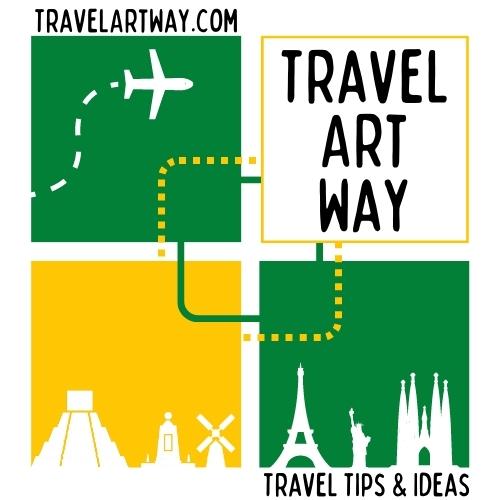
- Throughout this post you’ll find affiliated links & ads provided by marketing platforms like GetYourGuide. Links & ads that may help you plan the perfect trip to Valencia.
- If you click on them & buy a ticket for a museum or book a tour a small commission of your purchase will go to me (paid by the platform, without any extra cost to you).
- If you first want to learn a little bit more about me, the blog writer, click on: Better call me Art
TIP: Getting around in Spain – use the train
First of all, let’s start with a useful tip.
We travelled by train from Barcelona to Valencia (350 km/220 miles, duration 3,5 hours). Economic and very comfortable. Comparing our train ride to our flight from Quito to Madrid, is like escaping a can of sardines and stepping into a Rolls Royce. In other words, an easy ride, … conversing, reading, dreaming with my eyes open. And besides that, getting a good first impression of Spain’s interior.
Besides recommending you to travel by train, I would advise you to buy the train tickets in advance. It’s generally cheaper and you are guaranteed a seat. Our train was fully booked, because a lot of Spaniards were heading to the beaches in the South of Spain, like Alicante.
Valencia city center
From the train station we first headed out to our lodgings, just outside the city center. Meeting up with our niece Evi, who came over from the Netherlands to visit us. After settling in, we went to the city center on foot and discovered that walking is the best way to get to know the Ciutat Vella of Valencia.

TRAVELTip: Valencia Tourist Card & Getting Around
Because we planned to stay mostly in the city center & only headed out twice, we didn’t buy the city’s special tourist card.
However, the Valencia Tourist Card is very handy if you want to skip the lines at museums, hop on the public transport system for free (includes bus, metro & tram), and enjoy some attractive discounts at certain shops & restaurants.
To learn more, go to: Valencia Tourist Card
- The metro doesn’t cross the inner city center, but can bring you to the outskirts of town, the airport and the beach.
Another way to get around is to rent a bike (see TIP below).
Or alternatively you can buy a ticket for: The Hop-on Hop-off Bus

Valencia feels like a big village
Valencia is the third largest city of Spain, but after visiting Madrid (on an earlier trip) & Barcelona, it feels like a village. A big, easy going village.
One of the causes being the fact that there’s not much traffic in the central part of town. Surely, there are a lot of people – of which many are tourists – but the city has its own cozy & relaxing vibe.
… with its own particular history
As Barcelona, Valencia has its own long, interesting history. In the center you’ll find many beautiful historical buildings – like the:
- Catedral de Nuestra Señora de Valencia
- Iglesia de San Nicolás (church)
- Palacio de la Generalitat (where the highest authority of Valencia houses)
- Torres de Serranos (one of the former city gate)
- La Lonja de la Seda (the former Silk exchange)
- Oficina de Correos (Post office)
- Mercado Central (the market hall)
- Torres de Quart (another city gate, still visibly damaged by cannonballs used during the French invasion under Napoleon)
- & many more
Besides the historical sites, Valencia has many plazas or squares surrounded by restaurants, bars and shops. Terraces everywhere, for a bite and a drink.
In a few words, there’s a lot to discover in beautiful Valencia. On your own, or as part of one of the many walking or biking tours along Valencia’s highlights.
Alternatively you can tour the city on a Segway, or as part of a very popular Tuk-Tuk tour through Valencia.
The cathedral of Valencia
One of the main historical buildings to visit in Valencia is the cathedral. Officially, the Iglesia Catedral-Basílica Metropolitana de la Asunción de Nuestra Señora de Valencia.
Impressive by itself, but more so because of the presence of the Holy Grail – the drinking cup Jesus Christ supposedly used at the Last Supper.
- There are several churches in the world that claim the presence of the Holy Grail. The cathedral in Valencia is one of the most serious candidates though (together with the Cathedral of Genoa in Italy). People from all over the world come to Valencia de behold the Holy Grail.
- A believer or not in these kinds of legendary Christian stories, there’s certainly a lot of history surrounding the beautiful cup. For example, in connection with the crusades or the life & times of King Arthur. (I know, my namesake…but in this case you Better call me Art)

TRAVELTip: Buy a ticket to the cathedral
While we stood in a long line to get a ticket, I saw people sneaking into the cathedral to my left. No problem for me, but afterwards I learned that without an entrance ticket you don’t have access to certain parts of the cathedral.
One of them being the Capillo del Santo Cáliz or Chapel of the Holy Grail. A beautiful chapel in itself where you can admire the famous cup. Basically a simple design, but made of beautiful agate and – admittedly – embellished later on.
TRAVELTip: Discount with Student card
If you have one, bring your student card. Even our daughter – who’s studying in Quito, Ecuador – got discounts on tickets everywhere in Spain. Entrances to museums, monuments, churches & other attractions.
The City of the Arts & Sciences
On our first full day in Valencia we brought a visit to The City of the Arts & Sciences/ Ciutat de les Arts i les Ciènces. Because it’s located just outside of Valencia’s city center we decided to rent a bike.
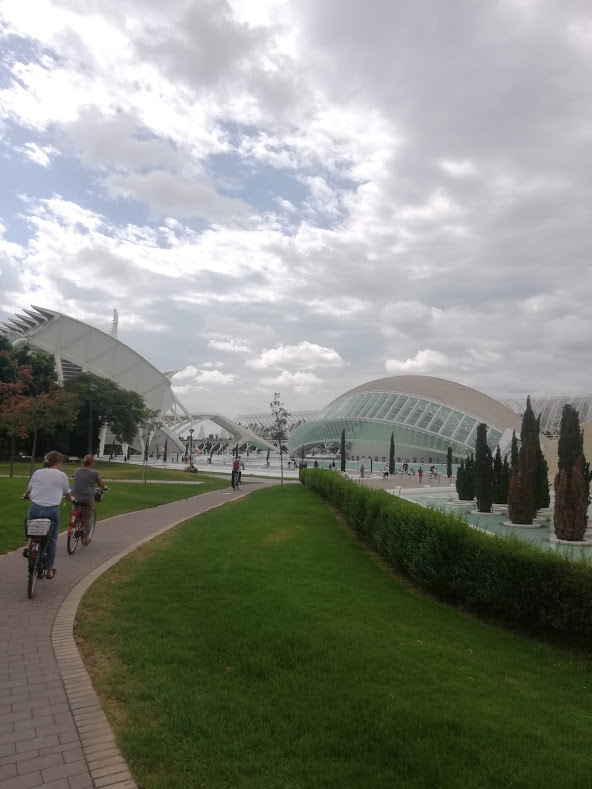
TRAVELTip: Rent a bike
The central part of Valencia is as flat as the Netherlands and perfect for using a bike. Besides that, the city center is almost traffic free and most Valencianos are fully aware that there’s a good chance they’ll meet up with cycling tourists.
There are several places to rent a bike and because of the healthy competition, it’s affordable too.
To learn more, click on: Rent a bike in Valencia
The best & most beautiful ride to the City of Arts & Sciences is the Jardines de Turia/ the Gardens of Turia. A beautiful park that is laid down in a former riverbed. It has cycle paths either way.
The first thing you see of the City of the Arts & Sciences are a series of eye-catching marvelous modern buildings. All of them designed by the Spanish architect Santiago Calatrava and his Spanish-Mexican colleague Félix Candela.
Every building houses at least one cultural attraction, like an art museum, a theatre, a cinema, a botanical & sculptural garden, a sports arena, & others.
Visit to the Oceanogràfic, Valencia
We decided to visit the Oceanogràfic. The biggest Aquarium of Spain & also one of the biggest in the whole world. It was rather expensive to get in, but absolutely worth your money.
Taking “Aquatic life” as a theme, the exposed water world goes on and on. Besides all sorts of fish – big (sharks!!!), small, dull and colourful – you pass water turtles, beavers, penguins, flamingos and what not.
It just doesn’t stop, and when you think you’ve seen it all, you’ll suddenly find yourself at a dolphin show.
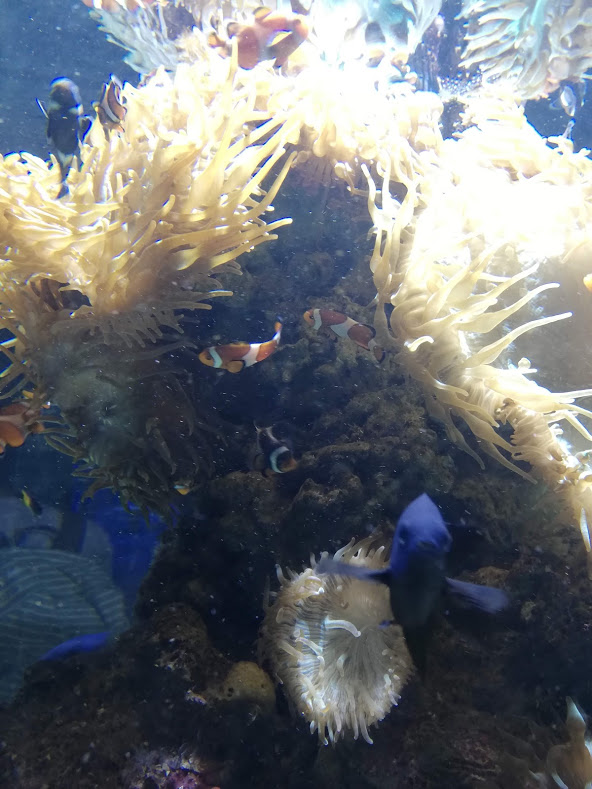

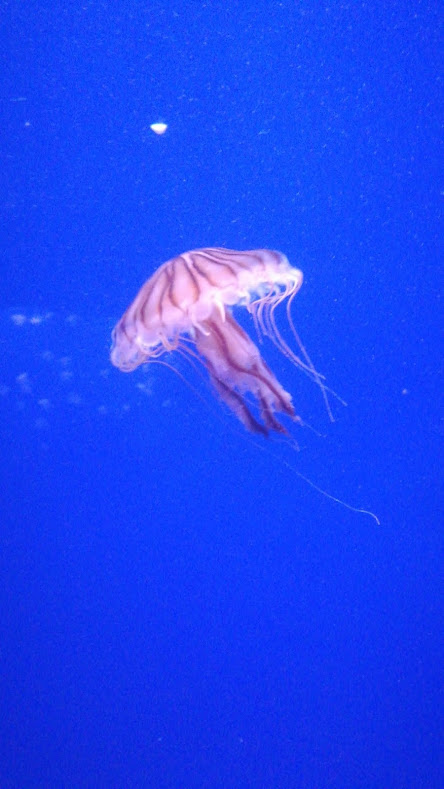
The Oceanogràfic provides a cool, recreational place, although there were thousands of visitors.
Highly recommended!
TRAVELTip: If you plan to visit this beautiful attraction, make sure to buy your tickets in advance & skip the long line. More so during the high season (July-September & around the Holidays like Christmas).
To learn more and/or buy tickets in advance, go to: Oceanogràfic, Valencia
Other popular things to do & visit at the City of the Arts & Sciences, Valencia are: (click on their names to learn more):
- the Science Museum/ Museu de les Ciències Príncipe Felipe
- the Hemisfèric, which was actually the first building at the City of Arts & Sciences, representing a great human eye, the eye of wisdom.

Alternatively there’s popular guided tour. A tour which is focused on the architectural highlights of the whole City of Arts & Sciences. Combining it with sunset dinner on the rooftop terrace overlooking a big part of the city of Valencia.
To learn more, click on: City of the Arts & Sciences tour & dinner


Visit to Valencia´s Botanical garden
The second day we started with a visit to the Botanical Garden/ Jardí Botànic of the University of Valencia. We had some difficulty finding it, but were surprised when we got there.
A beautiful, relaxing old fashioned garden with hundreds, if not thousands of trees, plants, flowers, that attract hundreds of birds (like the little green, noisy parrots that live in the palm trees) and as many cats.
My wife Wendy refused to leave at the end of our round through the garden. She wanted to build a little cottage there, right in the middle.
In short, a relaxing visit to one of the many green areas within the city of Valencia.
TRAVELTip: Alternatively there’s a popular zoo in Valencia, located at the western end of the Jardines de Turia. Actually just a nice walk away from the Botanical garden.
To learn more about the Valencia Zoo, click on: Bioparc Valencia
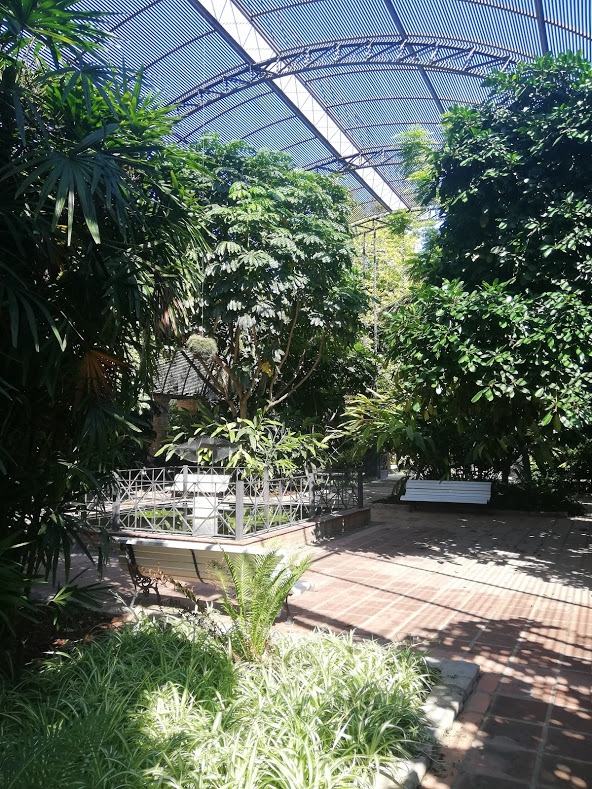
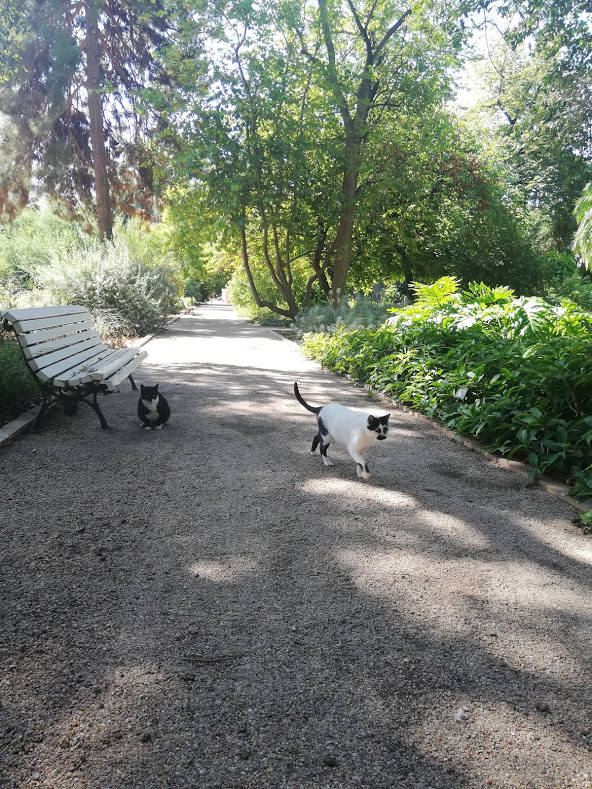
The rest of the day we “strolled” the city center, sniffing up the atmosphere. Eat, drink, watch passersby, enjoy one and another’s company. We did nothing and we did a lot, too much to remember, but one “thing to do” I can’t withhold you.
A “must see” in Valencia involves a visit to the traditional Horchatería de Santa Catalina. Above all, for the typical Horchata – a drink made of tiger nuts – that comes with a few long buns for dipping, called fartóns. It’s sweet, it’s tasty & it’s healthy.
Besides that, the cafeteria interior is beautiful and transfers you to times past – the Horchatería is more than 200 years old. And if you don’t like Horchata, there are a lot of other sweet bites for sale.
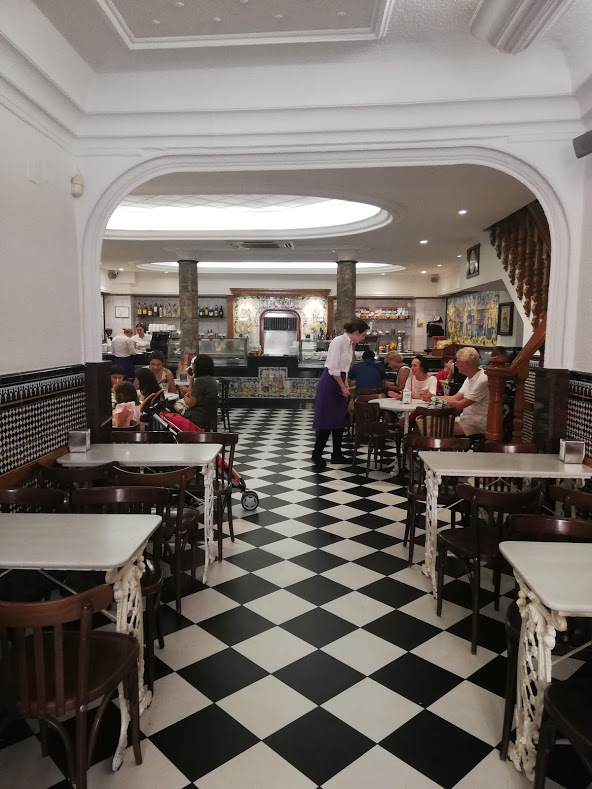
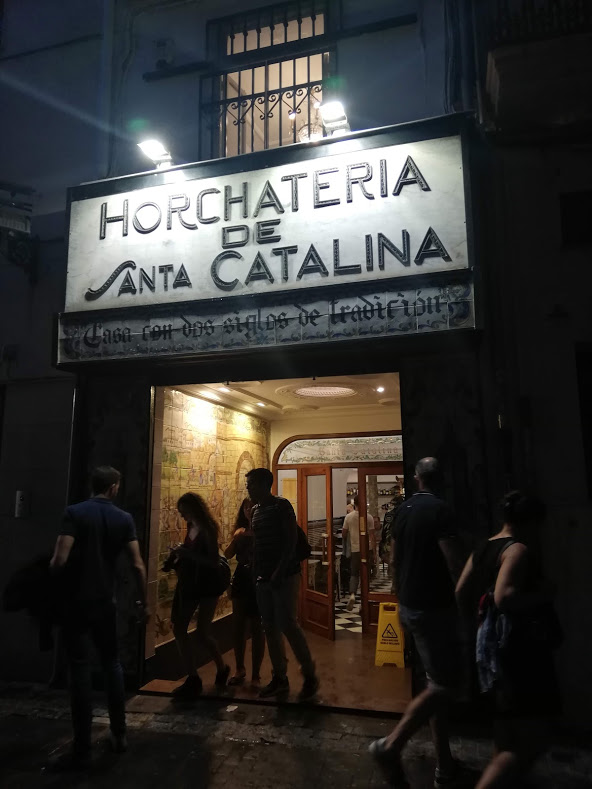
Finally, in the evening, we ended up – using the metro – in the neighbourhood of Ruzafa (or Russafa). A bohemian part of town where you’ll find many good restaurants, bars, and rare shops.
The beaches near Valencia
On our last day we decided to fully relax & visit one of the beaches near Valencia (again by metro). Well, actually the beach nearest to the town center is a series of beautiful beaches, over a three mile stretch.
I think we probably ended up at the beach closest to town, the Playa de las Arenas. A wide strip of sand, leading to a delightful sea. Ended up eating Paella… That is, real Paella!

Valencia’s most famous dish = Paella
The most famous culinary dish of Valencia is Paella. So famous actually, that you can’t do without ordering one during your visit to Valencia. A dish preferably prepared with rice from Valencia’s own rice fields at the Albufera lake area – paella’s birthplace – just outside of the city.
Thinking & hoping that (almost) everybody has a basic idea of what paella is, I won’t go into too much detail. One detail though is very important & highly discussed everywhere. Certainly among the Valencianos themselves.
It’s called Socorrat and refers to the crunchy rice you may expect at the bottom part of every paella-dish or pan. You get Socorrat turning up the flames just before serving, but timing is everything…. In other words, the crunchy part can’t be too soft or liquid, nor burned & hard.
We tried our first paella in the city center of Valencia, but – though tasteful – it didn’t taste anything crunchy at all. When I asked the waiter about it, he said that “most clients don’t like the crispy part, because it often gets overcooked and burned…”
WRONG! WRONG! … Our Spanish neighbours just laughed and nodded to us “No, no, no”,… maybe even feeling somewhat embarrassed.
TRAVELTip: So… where to find real-deal-paella
If you order paella during your visit to Valencia, I guess we all expect the real deal, right? That is to say, not the tourist version.
Asking around, people told us to avoid the center for a “real-deal-paella” and head to the outskirts of town, like the beach. And that’s where we enjoyed a “paella real”. Actually we shared a whole pan (provider of the name of the dish) between the four of us. Tasty, fresh and … crunchy. And… muchas gracias!

IMPORTANT: So, be careful where you eat! That’s not only a tip concerning a visit to Valencia, but also for other tourist places in Spain. Most importantly, be aware if the restaurant and food is authentic or “just for tourists”. At the restaurant on the beach we weren’t the only foreigners. Over 90% were Spaniards… Therefore, a good sign!
TRAVELTip: A Paella cooking class, food tour & visit to the Albufera rice fields near Valencia
Spain is very well known for its excellent culinary traditions. Diverse as the country itself. Valencia is no exception. Throughout the city you’ll find many restaurants, offering paella and other local & national dishes.
No surprise, you can participate in a Paella cooking class, offered by a local expert.
To learn more about this fun class, click on: Paella Cooking Class & Dinner

Another fun culinary thing to do in Valencia is joining a special food tour, presenting you the best tapas & wines produced in the area.
To learn more about this food tour, click on: Valencia Old Town food tour.
Finally, as the real-deal-paella can only be prepared by the locally produced rice, coming from Valencia’s own rice fields at Albufera – located just south of the city of Valencia – it must be no surprise there’s a popular day-trip visiting the lake area.
To learn more about this fun, relaxing & interesting day-trip, go to: Albufera Boat Tour

Day trip to Xàtiva (Valencia province)
In Valencia we rented a car for the rest of our trip through Spain. Train and bus transport in Spain are well organised, but a rented car of course gives you the liberty to stop & go wherever you want.
Our next destination was Úbeda in the interior of Spain. After that we would continue on to Granada & Sevilla, where we would hand in our rental car.
From Valencia we first drove southward to visit a little town called Xàtiva. Xàtiva is mostly known for its famous castle high above and the history connected to it. We arrived there in less than an hour and stayed there for a few more. So, it wasn’t actually a day trip for us, but it could easily be one from Valencia (50 km/30 miles).
Xativa Castle
The Xàtiva castle has a long history and you notice that when you walk the grounds. You pass all kinds of buildings, former living areas, a chapel, a burial chamber, a prison, high walls with cannons, towers, turrets…. Although mostly built in a European – that is gothic – style, you can still notice some Islamic influences, especially in the castle’s gardens.
Famous guests of Xàtiva castle
One of the most famous families that lived in the castle of Xàtiva was the Borja family. One of its members was Rodrigo de Borja, better known as Rodrigo de Borgia or Pope Alexander VI.
- This famous “Rodrigo” lived more than 500 years ago. Another, still living descendant is the also famous – well, at least for us – Rodrigo Borja Cevallos (1935-). Former president of Ecuador between 1988 & 1992.
Besides this notorious family, there are still a lot of ghost stories hanging around the castle. The famous Castilian knight El Cid fought around its walls in the 11th century.
And another legendary, but unfortunate guest was the Count James II (Jaime) of Urgel, who disputed the crown of Aragon with his famous brother Ferdinand. That is, thé Ferdinand who married Queen Isabella. Jaime was not only imprisoned for many years in the castle, but died there and still lies buried in the upper part of the castle.
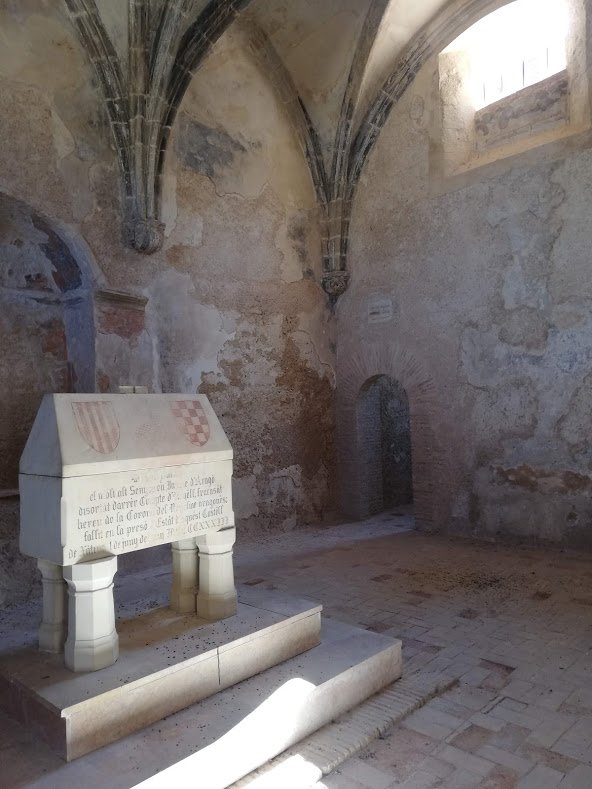
And then there’s the ghost of King Felipe V, who burned the whole city of Xàtiva, including its castle during the War of Spanish Succession, in the year 1708. Due to this act, many inhabitants died and were named the Socorrats… Got it? How cruel!
- Because of this brutal act the curator of the local historical museum – for an exposition in 1940 – decided to hang a portrait of the infamous king upside down. As it still does. Stuff for legends!
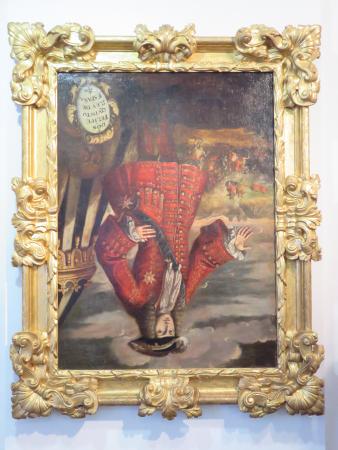
TRAVELTip: Take a break at the local bar/restaurant
At the entrance – or exit – of the castle you’ll find a perfect place to get a cup of coffee or whatever you like. It includes beautiful bird eye views of the region from its terrace.
For me, it was the first time – of many – that I had to think about Don Quijote de la Mancha & Sancho Panza, wandering through the Spanish plains we were admiring from above.

TRAVELTip: How to get to Xàtiva from Valencia?
All in all, a highly recommended visit. A day-trip from Valencia. But how to get there without a car.
By train
If you want to do it on your own, it’s best to take the train. That is, an early train (40 minutes). Very relaxed & a perfect way to get to know the inspiring surroundings of Valencia.
A good alternative, but more costly of course, is to take an organized bus tour from Valencia.
The Travel platform GetYourGuide offers a guided day-trip to 3 historical cities near Valencia, including Xàtiva.
To learn more: Day Trip from Valencia: Xàtiva, Ontinyent and Anna
Other popular day trips from Valencia
Besides day-trips to Albufera or medieval places like Xàtiva there are several other popular tours from Valencia, like:
Click on their names to learn more:
- A relaxing daytime or sunset Mediterranean Catamaran cruise in front of the Valencia coast (1 – 1.5 hours)
- An exploration on foot & on a boat of the impressive Caves of San José (actually a half-a-day tour)
- Touring the best natural spots near Valencia, like the Waterfall of Bridal Veil & Thermal Springs (whole day)
- A off-the road Jeep Safari Adventure through the spectacular Calderona Mountains near Valencia (4 hours)
- Visiting the historic Islamic/Berber Mountain Village of Bocairent & nearby caves (7 hours)
- A Cheese & Wine Tasting Tour in the Utiel-Requena region (1 hour distant, whole day tour).
To put our visit to Valencia in a few words:
Valencia is a beautiful city and visited by many tourists. A total that’s growing every year. The popularity of the town is understandable, but my personal impression is that Valencia is still adapting to the growing attention. A good thing, but one that takes time.
The city center shall probably transform itself more & more. Parts that still lie fallow, will probably soon be transformed into tourist businesses & hopefully it comes with a guarantee for good food & service.
We also noticed that some shops, restaurants and bars in the city center – specifically in the Russafa-neighbourhood – were closed because the owners were on vacation. Rightfully so, but maybe also a sign that not all of them are thinking in tourist seasons yet. In other words, it did surprise us a little bit, being high season still.
- To be honest, we noticed it in other tourist places in Spain too. Even places that (still) attract more tourists than Valencia.
In short, Valencia is a city with a lot of potential. Not only for its historical center, but also the many attractions around. A top destination which combines history, culture, culinary art & relaxation perfectly.
For an overview of all travel posts of my blog, go to: the Home Page.


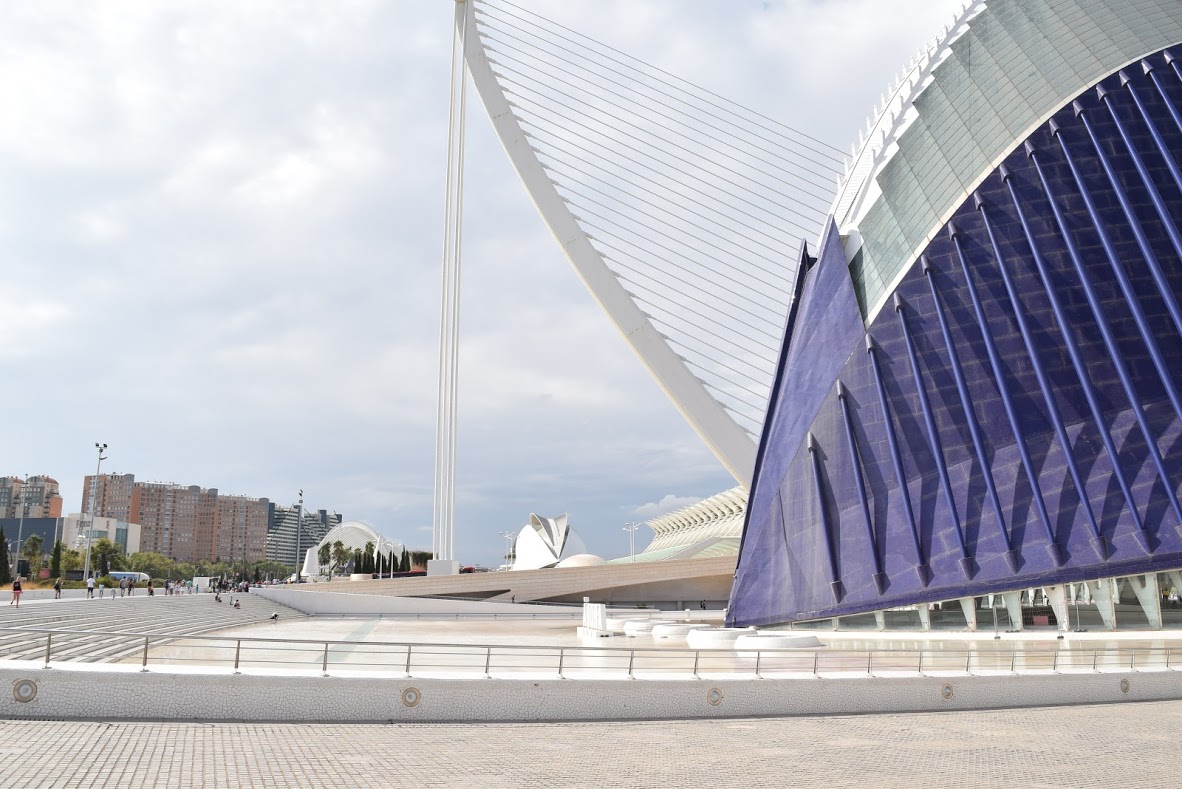
Comments
One response to “Useful tips & ideas for a visit to beautiful Valencia”
Very complete and helpful information, thanks so much! Valencia is on our wishlist (as Equador is😃)…have a Nice day!